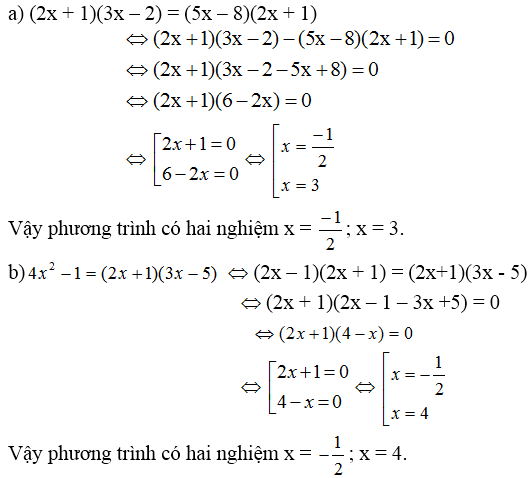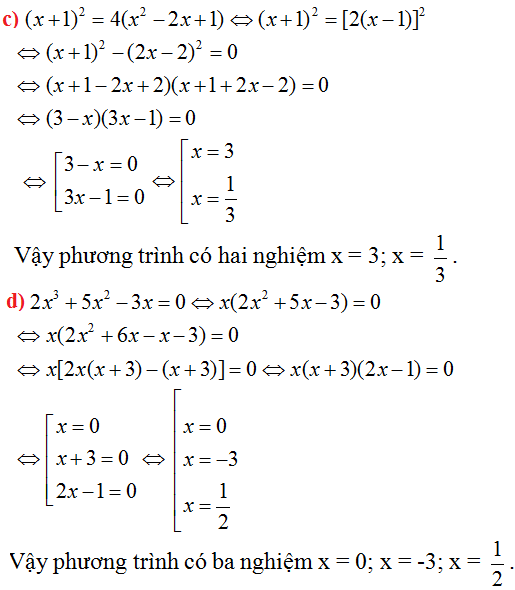Hãy nhập câu hỏi của bạn vào đây, nếu là tài khoản VIP, bạn sẽ được ưu tiên trả lời.

chẳng ai giải, thôi mình giải vậy!
a) Đặt \(y=x^2+4x+8\),phương trình có dạng:
\(t^2+3x\cdot t+2x^2=0\)
\(\Leftrightarrow t^2+xt+2xt+2x^2=0\)
\(\Leftrightarrow t\left(t+x\right)+2x\left(t+x\right)=0\)
\(\Leftrightarrow\left(2x+t\right)\left(t+x\right)=0\)
\(\Leftrightarrow\left(2x+x^2+4x+8\right)\left(x^2+4x+8+x\right)=0\)
\(\Leftrightarrow\orbr{\begin{cases}x=-2\\x=-4\end{cases}}\)vậy tập nghiệm của phương trình là:S={-2;-4}
b) nhân 2 vế của phương trình với 12 ta được:
\(\left(6x+7\right)^2\left(6x+8\right)\left(6x+6\right)=72\)
Đặt y=6x+7, ta được:\(y^2\left(y+1\right)\left(y-1\right)=72\)
giải tiếp ra ta sẽ được S={-2/3;-5/3}
c) \(\left(x-2\right)^4+\left(x-6\right)^4=82\)
S={3;5}
d)s={1}
e) S={1;-2;-1/2}
f) phương trình vô nghiệm

1) 3(x - 1)2 - 3x(x - 5) = 1
⇒ 3(x2 - 2x + 1) - 3x2 + 15x = 1
⇒ 3x2 - 6x + 3 - 3x2 + 15x = 1
⇒ 9x = 1 - 3
⇒ 9x = -2
⇒ x = \(\dfrac{-2}{9}\)
2) (6x−2)2+(5x−2)2−4(3x−1)(5x−2)=0
⇒ (6x - 2)2 + (5x - 2)2 -4(6x - 2)(5x - 2) = 0
⇒ (6x - 2)2 -2(6x - 2)(5x - 2) + (5x - 2)2 -2(6x - 2)(5x - 2) = 0
⇒ (6x - 2)(6x - 2 - 5x +2) + (5x - 2)(5x - 2 - 6x + 2) = 0
⇒ x(6x - 2) - x(5x - 2) = 0
⇒ x(6x - 2 - 5x +2) = 0
⇒ xx = 0
⇒ x = 0
Còn mấy cái sau mình trả lời sau nha ![]()
Còn hai câu sau nữa nè :)
3) (2x - 5)(2x + 5) - 1 = 0
⇒ 4x2 - 25 - 1 = 0
⇒ 4x2 = 26
⇒ x2 = \(\dfrac{13}{2}\)
⇒ x = \(\sqrt{\dfrac{13}{2}}\) hoặc x = -\(\sqrt{\dfrac{13}{2}}\)
4) 5x2 - 20 = 0
⇒ 5x2 = 20
⇒ x2 = 4
⇒ x = 2 hoặc x = -2

a: \(\Leftrightarrow x^2\left(x^2+x-12\right)=0\)
\(\Leftrightarrow x^2\left(x+4\right)\left(x-3\right)=0\)
hay \(x\in\left\{0;-4;3\right\}\)
d: \(\left(x^2+5x\right)^2-2\left(x^2+5x\right)-24=0\)
\(\Leftrightarrow\left(x^2+5x-6\right)\left(x^2+5x+4\right)=0\)
\(\Leftrightarrow\left(x+6\right)\left(x-1\right)\left(x+1\right)\left(x+4\right)=0\)
hay \(x\in\left\{-6;1;-1;-4\right\}\)
f: \(x\left(x+1\right)\left(x-1\right)\left(x+2\right)=24\)
\(\Leftrightarrow\left(x^2+x\right)\left(x^2+x-2\right)=24\)
\(\Leftrightarrow\left(x^2+x\right)^2-2\left(x^2+x\right)-24=0\)
\(\Leftrightarrow x^2+x-6=0\)
\(\Leftrightarrow\left(x+3\right)\left(x-2\right)=0\)
hay \(x\in\left\{-3;2\right\}\)

n) \(\left|3-x\right|+x^2-x\left(x+4\right)=0\)
\(\Rightarrow\left|3-x\right|+x^2-x^2-4x=0\)
\(\Leftrightarrow\left[{}\begin{matrix}3-x-4x=0\left(đk:3-x\ge0\right)\\-\left(3-x\right)-4x=0\left(đk:3-x< 0\right)\end{matrix}\right.\)
\(\Leftrightarrow\left[{}\begin{matrix}x=\dfrac{3}{5}\left(đk:x\le3\right)\\x=-1\left(đk:x>3\right)\end{matrix}\right.\)
\(\Rightarrow\left[{}\begin{matrix}x=\dfrac{3}{5}\\x\in\varnothing\end{matrix}\right.\)
Vậy \(x=\dfrac{3}{5}\)
m) \(\left(x-1\right)^2+\left|x+21\right|-x^2-13=0\)
\(\Rightarrow x^2-2x+1+\left|x+21\right|-x^2-13=0\)
\(\Leftrightarrow-2x-12+\left|x+21\right|=0\)
\(\Leftrightarrow\left[{}\begin{matrix}-2x-12+x+21=0\left(đk:x+21\ge0\right)\\-2x-12-\left(x+21\right)=0\left(đk:x+21< 0\right)\end{matrix}\right.\)
\(\Leftrightarrow\left[{}\begin{matrix}x=9\left(đk:x\ge-21\right)\\x=-11\left(đk:x< -21\right)\end{matrix}\right.\)
\(\Rightarrow\left[{}\begin{matrix}x=9\\x\in\varnothing\end{matrix}\right.\)
Vậy \(x=9\)
e) \(\left|5x\right|=3x-2\)
\(\Rightarrow5\cdot\left|x\right|=3x-2\)
\(\Leftrightarrow5\cdot\left|x\right|-3x=-2\)
\(\Leftrightarrow\left[{}\begin{matrix}5x-3x=-2\left(đk:x\ge0\right)\\5\cdot\left(-x\right)-3x=-2\left(đk:x< 0\right)\end{matrix}\right.\)
\(\Leftrightarrow\left[{}\begin{matrix}x=-1\left(đk:x\ge0\right)\\x=\dfrac{1}{4}\left(đk:x< 0\right)\end{matrix}\right.\)
\(\Rightarrow\left[{}\begin{matrix}x\in\varnothing\\x\in\varnothing\end{matrix}\right.\)
Vậy \(x\in\varnothing\)
g) \(\left|-2,5x\right|=x-12\)
\(\Rightarrow2,5\cdot\left|x\right|=x-12\)
\(\Leftrightarrow2x5\cdot\left|x\right|-x=-12\)
\(\Leftrightarrow\left[{}\begin{matrix}2,5x-x=-12\left(đk:x\ge0\right)\\2,5\cdot\left(-x\right)-x=-12\left(đk:x< 0\right)\end{matrix}\right.\)
\(\Leftrightarrow\left[{}\begin{matrix}x=-8\left(đk:x\ge0\right)\\x=\dfrac{24}{7}\left(đk:x< 0\right)\end{matrix}\right.\)
\(\Rightarrow\left[{}\begin{matrix}x\in\varnothing\\x\in\varnothing\end{matrix}\right.\)
Vậy \(x\in\varnothing\)

\(x^2-5x+6=\left(x-3\right)\left(x-2\right)=0\)
\(\Leftrightarrow\orbr{\begin{cases}x-3=0\\x-2=0\end{cases}\Leftrightarrow\orbr{\begin{cases}x=3\\x=2\end{cases}}}\)
1, <=>x^2-x-2 = x^2-4
<=>x^2-4-x^2+x+2 = 0
<=> x-2 = 0
<=> x=2
2, <=> (x-2).(x-3)=0
<=> x-2 = 0 hoặc x-3 = 0
<=> x=2 hoặc x=3

Bài làm
~ Bạn Thủy bên dưới có vẻ bị Lag mạnh, bài dễ như này mà cũng dùng denta với đen tiếc. Đéo biết làm thì đừng làm chứ đéo phải làm cái kiểu mà lớp 8 chưa học nhé bạn >.<, câu c dòng thứ hai với dòng thứ 3 không phải là thừa sao? đã vậy câu c làm sai đề nữa, bên trên là 1 - 5x. bên dưới là 1 + 5x . câu cuối cũng sai hằng đẳng thức, phải là +16x chứ hông phỉa -16x.~
a) 2x + 5 = 20 - 3x
<=> 2x + 3x = 20 + 5
<=> 5x = 25
<=> x = 5
Vậy x = 5 là nghiệm phương trình.
b) 4x2 + 5x = 0
<=> x( 4x + 5 ) = 0
<=> \(\orbr{\begin{cases}x=0\\4x+5=0\end{cases}\Leftrightarrow\orbr{\begin{cases}x=0\\x=-\frac{5}{4}\end{cases}}}\)
Vậy S = { 0; -5/4 }
c) \(\left(x-2\right)^2=1-5x\)
<=> \(x^2-4x+4=1-5x\)
<=> x2 - 4x + 5x - 1 + 4 = 0
<=> x2 + x + 3 = 0
<=> \(x^2+x.2.\frac{1}{2}+\frac{1}{4}+\frac{11}{4}=0\)
<=> \(\left(x^2+x+\frac{1}{4}\right)=-\frac{11}{4}\)
\(\Leftrightarrow\left(x+\frac{1}{2}\right)^2=-\frac{11}{4}\)( vô lí )
Vậy phương trình vô nghiệm.
d) x2 + 5x + 6 = 0
<=> x2 + 2x + 3x + 6 = 0
<=> x( x + 2 ) + 3( x + 2 ) = 0
<=> ( x + 3 )( x + 2 ) = 0
<=> \(\orbr{\begin{cases}x+3=0\\x+2=0\end{cases}\Leftrightarrow\orbr{\begin{cases}x=-3\\x=-2\end{cases}}}\)
Vậy tập nghiệm phương trình S = { -3; -2 }
e) x4 - 5x2 + 4 = 0
<=> x4 - x2 - 4x2 + 4 = 0
<=> x2( x2 - 1 ) - 4( x2 - 1 ) = 0
<=> ( x2 - 1 )( x2 - 4 ) = 0
<=> ( x - 1 )( x + 1 )( x - 2 )( x + 2 ) = 0
<=> \(\orbr{\begin{cases}x-1=0\\x+1=0\end{cases}\Leftrightarrow\orbr{\begin{cases}x=1\\x=-1\end{cases}}}\)
\(\orbr{\begin{cases}x-2=0\\x+2=0\end{cases}\Leftrightarrow\orbr{\begin{cases}x=2\\x=-2\end{cases}}}\)
Vậy tập nghiệm phương trình S = { 1; -1; 2; -2 }
f) 5( x2 - 3x ) = ( 4x + 2 )2 + 1
<=> 5x2 - 15x = 16x2 + 16x + 4 + 1
<=> 5x2 - 16x2 - 15x - 16x - 4 - 1 = 0
<=> -11x2 - 31x - 5 = 0
<=> -( 11x2 + 31x + 5 ) = 0
Ta có:( 11x2 + 31x + 5 ) > 0 V x
=> -( 11x2 + 31x + 5 ) < 0 V x
=> -( 11x2 + 31x + 5 ) = 0 ( vô lí )
Vậy phương trình vô nghiệm.
a, \(2x+5=20-3x\)
\(2x+5-20+3x=0\)
\(5x-15=0\Leftrightarrow5x=15\Leftrightarrow x=3\)
b, \(4x^2+5x=0\)
\(x\left(4x+5\right)=0\)
\(x=0\)
\(4x+5=0\Leftrightarrow4x=-5\Leftrightarrow x=-\frac{5}{4}\)
c, \(\left(x-2\right)^2=1-5x\)
\(\left(x-2\right)=\pm\sqrt{1-5x}\)
\(x-2=\sqrt{1+5x}\)
\(x^2-4x+4=1+5x\)
\(x^2-4x+4-1-5x=0\)
\(x^2-9x+3=0\)
\(\Delta=b^2-4ac=\left(-9\right)^2-4.3.1=81-12=69>0\)
Nên pt có 2 nghiệm phân biệt
\(x_1=\frac{9-\sqrt{69}}{2.1}=\frac{9-\sqrt{69}}{2}\)
\(x_2=\frac{9+\sqrt{69}}{2.1}=\frac{9+\sqrt{69}}{2}\)

a)(2x+1)(3x-2)=(5x-8)(2x+1)
⇔(2x+1)(3x-2)-(5x-8)(2x+1)=0
⇔(2x+1)(3x-2-5x+8)=0
⇔(2x+1)(-2x+6)=0
⇔2x+1=0 hoặc -2x+6=0
1.2x+1=0⇔2x=-1⇔x=-1/2
2.-2x+6=0⇔-2x=-6⇔x=3
phương trình có 2 nghiệm x=-1/2 và x=3


Tớ học ngu nên chỉ biết cách nhân ra rồi rút gọn chứ không biết cách nào ngắn hơn :)) Hơi dài dòng nên phân tích từng vế 1 nhé :D
2/ \(\left(2x^2+5x-204\right)^2+4\left(x^2-5x-206\right)=4\left(2x^2+5x-204\right)\left(x^2-5x-206\right)\)
*****\(VT=\left(2x^2+5x-204\right)^2+4\left(x^2-5x-206\right)^2\)
\(=4x^4+25x^2+41616+20x^3-816x^2-2040x+4\left(x^4-387x^2+42436-10x^3+2060x\right)\)
\(=4x^2+25x^2+41616+20x^3-816x^2-2040x+4x^2-1548x^2+169744-40x^3+8240x\)
\(=8x^4-1523x^2+6200x+211360\)
*****\(VP=\left(8x^2+20x-816\right)\left(x^2-5x-206\right)\)
\(=8x^4-40x^3-1648x^2-100x^2-4120x-816x^2+4080x+168096\)
\(=8x^4-1748x^2-40x+168096\)
\(\Rightarrow8x^4-1523x^2+6200x+211360=8x^4-1748x^2-40x+168096\)
\(\Leftrightarrow-1523x^2+6200x+211360+1748x^2-40x+168096=0\)
\(\Leftrightarrow255x^2+43264+6240x=0\)
\(\Leftrightarrow\left(15x+208\right)^2=0\)
\(\Leftrightarrow15x+208=0\)
\(\Leftrightarrow x=-\frac{208}{15}\)
+ Ta có: \(x^4-5x^3+6x^2+5x+1=0\)
\(\Rightarrow x^2-5x+6+\frac{5}{x}+\frac{1}{x^2}=0\)( chia cả hai vế cho \(x^2\))
\(\Leftrightarrow\left(x^2+\frac{1}{x^2}\right)-\left(5x-\frac{5}{x}\right)+6=0\)
\(\Leftrightarrow\left(x^2+\frac{1}{x^2}\right)-5.\left(x-\frac{1}{x}\right)+6=0\)( *** )
- Đặt \(x-\frac{1}{x}=a\)\(\Rightarrow\)\(x^2+\frac{1}{x^2}=a^2+2\)
- Thay \(a=x-\frac{1}{x};\)\(a^2+2=x^2+\frac{1}{x^2}\)vào ( *** )
- Ta có: \(a^2+2-5a+6=0\)
\(\Leftrightarrow a^2-5a+8=0\)
\(\Leftrightarrow4a^2-20a+32=0\)
\(\Leftrightarrow\left(4a^2-20a+25\right)+7=0\)
\(\Leftrightarrow\left(2a-5\right)^2+7=0\)
- Ta lại có: \(\hept{\begin{cases}\left(2a-5\right)^2\ge0\forall a\\7>0\end{cases}}\Rightarrow \left(2a-5\right)^2+7\ge7>0\)mà \(\left(2a-5\right)^2+7=0\)
\(\Rightarrow\left(2a-5\right)^2+7\)( vô nghiệm ) \(\Rightarrow\)\(x^4-5x^3+6x^2+5x+1=0\)( vô nghiệm )
Vậy \(S=\left\{\varnothing\right\}\)
+ Ta có: \(\left(2x^2+5x-204\right)^2+4.\left(x^2-5x-206\right)=4.\left(2x^2+5x-204\right).\left(x^2-5x-206\right)\)( ** )
- Đặt \(a=2x^2+5x-204;\)\(b=x^2-5x-206\)\(\Rightarrow\)\(a.b=\left(2x^2+5x-204\right).\left(x^2-5x-206\right)\)
- Thay \(a=2x^2+5x-204;\)\(b=x^2-5x-206\)\(\Rightarrow\)\(a.b=\left(2x^2+5x-204\right).\left(x^2-5x-206\right)\)
vào ( ** )
- Ta có: \(a^2+4b^2=4ab\)
\(\Leftrightarrow a^2-4ab+4b^2=0\)
\(\Leftrightarrow\left(a-2b\right)^2=0\)
\(\Leftrightarrow a-2b=0\)
\(\Leftrightarrow a=2b\)( * )
- Thay \(a=2x^2+5x-204;\)\(b=x^2-5x-206\)vào ( * )
- Ta lại có: \(2x^2+5x-204=2.\left(x^2-5x-206\right)\)
\(\Leftrightarrow2x^2+5x-204=2x^2-10x-412\)
\(\Leftrightarrow\left(2x^2-2x^2\right)+\left(5x+10x\right)=-\left(412-204\right)\)
\(\Leftrightarrow15x=-208\)
\(\Leftrightarrow x=-\frac{208}{15} \left(TM\right)\)
Vậy \(S=\left\{-\frac{208}{15}\right\}\)